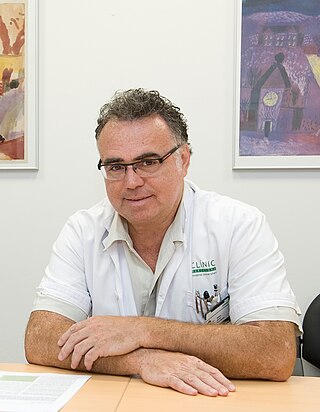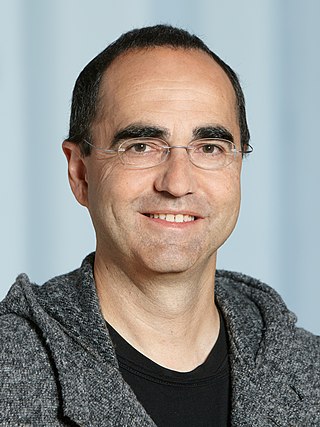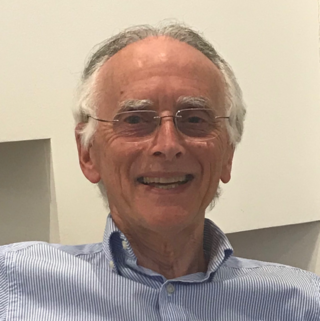Related Research Articles
Studies that are in vivo are those in which the effects of various biological entities are tested on whole, living organisms or cells, usually animals, including humans, and plants, as opposed to a tissue extract or dead organism. This is not to be confused with experiments done in vitro, i.e., in a laboratory environment using test tubes, Petri dishes, etc. Examples of investigations in vivo include: the pathogenesis of disease by comparing the effects of bacterial infection with the effects of purified bacterial toxins; the development of non-antibiotics, antiviral drugs, and new drugs generally; and new surgical procedures. Consequently, animal testing and clinical trials are major elements of in vivo research. In vivo testing is often employed over in vitro because it is better suited for observing the overall effects of an experiment on a living subject. In drug discovery, for example, verification of efficacy in vivo is crucial, because in vitro assays can sometimes yield misleading results with drug candidate molecules that are irrelevant in vivo.

Pharmacology is a science of medical drug and medication, including a substance's origin, composition, pharmacokinetics, therapeutic use, and toxicology. More specifically, it is the study of the interactions that occur between a living organism and chemicals that affect normal or abnormal biochemical function. If substances have medicinal properties, they are considered pharmaceuticals.
In molecular biology and pharmacology, a small molecule or micromolecule is a low molecular weight organic compound that may regulate a biological process, with a size on the order of 1 nm. Many drugs are small molecules; the terms are equivalent in the literature. Larger structures such as nucleic acids and proteins, and many polysaccharides are not small molecules, although their constituent monomers are often considered small molecules. Small molecules may be used as research tools to probe biological function as well as leads in the development of new therapeutic agents. Some can inhibit a specific function of a protein or disrupt protein–protein interactions.

Lipinski's rule of five, also known as Pfizer's rule of five or simply the rule of five (RO5), is a rule of thumb to evaluate druglikeness or determine if a chemical compound with a certain pharmacological or biological activity has chemical properties and physical properties that would likely make it an orally active drug in humans. The rule was formulated by Christopher A. Lipinski in 1997, based on the observation that most orally administered drugs are relatively small and moderately lipophilic molecules.

Robert Samuel Langer Jr. FREng is an American biotechnologist, businessman, chemical engineer, chemist, and inventor. He is one of the eight Institute Professors at the Massachusetts Institute of Technology.

Solomon Halbert Snyder is an American neuroscientist who has made wide-ranging contributions to neuropharmacology and neurochemistry. He studied at Georgetown University, and has conducted the majority of his research at the Johns Hopkins School of Medicine. Many advances in molecular neuroscience have stemmed from Snyder's identification of receptors for neurotransmitters and drugs, and elucidation of the actions of psychotropic agents. He received the Albert Lasker Award for Basic Medical Research in 1978 for his research on the opioid receptor, and is one of the most highly cited researchers in the biological and biomedical sciences, with the highest h-index in those fields for the years 1983–2002, and then from 2007 to 2019.
Robert R. Ruffolo was president of research and development for Wyeth Pharmaceuticals, and corporate senior vice president of Wyeth from 2001 to 2008. In that role, he managed an R&D organization of 7,000 scientists, with an annual budget of $3 billion. During his career in the pharmaceutical industry, Ruffolo played a significant role in the discovery and/or development of a number of marketed products, including dobutamine (Dobutrex) for the acute management of congestive heart failure, and eprosartan (Teveten) for hypertension. He holds the patent for the discovery of use of carvedilol (Coreg) for the treatment of congestive heart failure which changed the paradigm for the treatment of this devastating disease, and he led the research team that discovered ropinerole (Requip) for Parkinson's Disease. Ruffolo was awarded the Discoverers Award in 2008 by the Pharmaceutical Research and Manufacturers Association (PhRMA), for his pioneering work on the discovery of carvedilol for congestive heart failure.
A lead compound in drug discovery is a chemical compound that has pharmacological or biological activity likely to be therapeutically useful, but may nevertheless have suboptimal structure that requires modification to fit better to the target; lead drugs offer the prospect of being followed by back-up compounds. Its chemical structure serves as a starting point for chemical modifications in order to improve potency, selectivity, or pharmacokinetic parameters. Furthermore, newly invented pharmacologically active moieties may have poor druglikeness and may require chemical modification to become drug-like enough to be tested biologically or clinically.
The Myelin Repair Foundation (MRF) is a 501(c)(3) not-for-profit organization based in Saratoga, California. The organization applies a collaborative business model to the process of medical research with the aim of accelerating the identification and development of new patient treatments. MRF's goal is to license its first drug target for commercial drug development by July 1, 2009, five years after the organization began funding research.

Harren Jhoti is an Indian-born British structural biologist whose main interest has been rational drug design and discovery. He is president and chief executive officer (CEO) of biotechnology company Astex Pharmaceuticals ("Astex") which is located in Cambridge, United Kingdom.
Gabriel Leon "Gabbie" Plaa was an American-Canadian toxicologist. A specialist of hepatotoxicity, he held various administrative position at Université de Montréal from 1968 to 1989, receiving the grade of professor emeritus upon his retirement in 1996. Over the course of his career he was president of several scientific society and served in editorial capacity for numerous scientific journals. Amongst many awards, he was the first recipient of the Society of Toxicology's (SOT) Achievement Award, an award granted to a "promising young scientist".
Bhushan Patwardhan is a Distinguished Professor of Health Sciences, biomedical scientist, and ethnopharmacologist. He serves as the chairman of the Interdisciplinary AYUSH R&D Task Force on COVID-19 and India Lead, WHO Global Centre for Traditional Medicine Task Force. He is also a member of the Lancet Citizens' Commission on Reimagining India’s Health System. Until March 4, 2021, Patwardhan served as the Vice Chairman of the University Grants Commission, New Delhi, and Chairman i/c of the Indian Council of Social Science Research. He is Cochair for the Expert Group on Traditional Medicine constituted by World Health Organization, Geneva.

Eduard Vieta Pascual is a Spanish psychiatrist and a leading scientific authority on the neurobiology and treatment of bipolar disorder.

Joseph Kost is an Israeli academic, currently holder of The Abraham and Bessie Zacks Chair in Biomedical Engineering and the past Dean of the Faculty of Engineering Sciences at the Ben-Gurion University of the Negev.
Hartmut Derendorf was a German-American pharmacist and clinical pharmacologist, a distinguished emeritus professor of pharmaceutics at University of Florida. A significant figure in his field, Derendorf published over 20 papers each with over 100 citations.
Raymond F. Schinazi is an American organic medicinal chemist at Emory University with expertise in antiviral agents, pharmacology, and biotechnology. His research focuses on developing treatments for infections caused by human immunodeficiency virus (HIV), hepatitis B (HBV), hepatitis C (HCV), herpes, dengue fever, zika, chikungunya, and other emerging viruses. These treatment options include antiviral agents as well as synthetic, biochemical, pharmacological and molecular genetic approaches, including molecular modeling and gene therapy.

Dr. Jean-Christophe Leroux is a French-Canadian full professor of Drug Formulation and Delivery at the Institute of Pharmaceutical Sciences at the Swiss Federal Institute of Technology ETH Zürich. His research is mainly focused on broadening the field of drug delivery, and the development of biodetoxification systems for the treatment of metabolite disorders. Additionally, he has made important contributions to the field of biomaterials for use in drug delivery.

Malcolm Rowland FBPhS is Emeritus Professor of Pharmacy, University of Manchester, and Adjunct Professor, University of California San Francisco. His research in pharmacology, has been particularly in physiologically based pharmacokinetics. He has written several textbooks on the subject.
References
- 1 2 3 "Melior Discovery scientific advisors" . Retrieved 16 June 2015.
- ↑ "Christopher A. Lipinski citation rankings". Exaly. Retrieved 2022-07-17.
- 1 2 "scientific advisor" . Retrieved 16 June 2015.
- ↑ Lipinski, C. A.; Lombardo, F.; Dominy, B. W.; Feeney, P. J. (2001). "Experimental and computational approaches to estimate solubility and permeability in drug discovery and development settings". Advanced Drug Delivery Reviews. 46 (1–3): 3–26. doi:10.1016/S0169-409X(00)00129-0. PMID 11259830.
- ↑ "Industry News: Dr. Christopher A. Lipinski Receives the 2006 SBS Achievement Award" . Retrieved 16 June 2015.